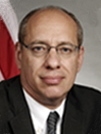
The Children's Online Privacy Protection Act of 1998 (COPPA) is a United States federal law, located at 15 U.S.C. §§ 6501–6506.

The Federal Trade Commission (FTC) is an independent agency of the United States government whose principal mission is the enforcement of civil (non-criminal) antitrust law and the promotion of consumer protection. The FTC shares jurisdiction over federal civil antitrust law enforcement with the Department of Justice Antitrust Division. The agency is headquartered in the Federal Trade Commission Building in Washington, DC.
Rambus Inc. is an American technology company that designs, develops and licenses chip interface technologies and architectures that are used in digital electronics products. The company, founded in 1990, is well known for inventing RDRAM and for its intellectual property-based litigation following the introduction of DDR-SDRAM memory.
In computing, Internet geolocation is software capable of deducing the geographic position of a device connected to the Internet. For example, the device's IP address can be used to determine the country, city, or ZIP code, determining its geographical location. Other methods include examination of Wi-Fi hotspots.
A data broker is an individual or company that specializes in collecting personal data or data about people, mostly from public records but sometimes sourced privately, and selling or licensing such information to third parties for a variety of uses. Sources, usually Internet-based since the 1990s, may include census and electoral roll records, social networking sites, court reports and purchase histories. The information from data brokers may be used in background checks used by employers and housing.
Personal data, also known as personal information or personally identifiable information (PII), is any information related to an identifiable person.

In marketing, geomarketing is a discipline that uses geolocation in the process of planning and implementation of marketing activities. It can be used in any aspect of the marketing mix — the product, price, promotion, or place. Market segments can also correlate with location, and this can be useful in targeted marketing.
Illumina, Inc. is an American biotechnology company, headquartered in San Diego, California. Incorporated on April 1, 1998, Illumina develops, manufactures, and markets integrated systems for the analysis of genetic variation and biological function. The company provides a line of products and services that serves the sequencing, genotyping and gene expression, and proteomics markets, and serves more than 155 countries.
Scams in intellectual property include scams in which inventors and other rights holders are lured to pay money for an apparently official registration of their intellectual property, or for professional development and promotion of their ideas, but do not receive the expected services.

In geomarketing and internet marketing, geotargeting is the method of delivering different content to visitors based on their geolocation. This includes country, region/state, city, metro code/zip code, organization, IP address, ISP, or other criteria. A common usage of geotargeting is found in online advertising, as well as internet television with sites such as iPlayer and Hulu. In these circumstances, content is often restricted to users geolocated in specific countries; this approach serves as a means of implementing digital rights management. Use of proxy servers and virtual private networks may give a false location.
Geobytes is a global company that provides geolocation and anti-spam software. Geobytes was incorporated in Delaware, USA in 1999.

Jonathan David Leibowitz is an American attorney who served under President Barack Obama as Chair of the Federal Trade Commission (FTC) from 2009 to 2013. Leibowitz was appointed to the commission in 2004, and resigned in 2013. During Leibowitz's tenure, the FTC brought privacy cases against Google, Facebook and others for violating consumer privacy, as well as enforcement against "pay-for-delay" deals in which pharmaceutical companies paid competitors to stay out of the market. Prior to joining the FTC, Leibowitz was Vice President for Congressional Affairs from 2000 to 2004 of the MPAA.
Cyril Lionel Houri is a New York-based inventor and entrepreneur who has founded two geolocation technology companies: InfoSplit, Inc. and Mexens Technology Inc.. Houri is recognized as one of the inventors of IP address geolocation, and has contributed in the advance of WiFi and cellular positioning technologies. For his expertise, he testified as an expert witness on location-based technology in LICRA vs. Yahoo!.

The Interactive Advertising Bureau (IAB) is an American advertising business organization that develops industry standards, conducts research, and provides legal support for the online advertising industry. The organization represents many of the most prominent media outlets globally, but mostly in the United States, Canada and Europe.
The NAI (Network Advertising Initiative) is an industry trade group founded in 2000 that develops self-regulatory standards for online advertising. Advertising networks created the organization in response to concerns from the Federal Trade Commission and consumer groups that online advertising — particularly targeted or behavioral advertising — harmed user privacy. The NAI seeks to provide self-regulatory guidelines for participating networks and opt-out technologies for consumers in order to maintain the value of online advertising while protecting consumer privacy. Membership in the NAI has fluctuated greatly over time, and both the organization and its self-regulatory system have been criticized for being ineffective in promoting privacy.

The United States Federal Trade Commission (FTC) has been involved in oversight of the behavioral targeting techniques used by online advertisers since the mid-1990s. These techniques, initially called "online profiling", are now referred to as "behavioral targeting"; they are used to target online behavioral advertising (OBA) to consumers based on preferences inferred from their online behavior. During the period from the mid-1990s to the present, the FTC held a series of workshops, published a number of reports, and gave numerous recommendations regarding both industry self-regulation and Federal regulation of OBA. In late 2010, the FTC proposed a legislative framework for U.S. consumer data privacy including a proposal for a "Do Not Track" mechanism. In 2011, a number of bills were introduced into the United States Congress that would regulate OBA.
Do Not Track legislation protects Internet users' right to choose whether or not they want to be tracked by third-party websites. It has been called the online version of "Do Not Call". This type of legislation is supported by privacy advocates and opposed by advertisers and services that use tracking information to personalize web content. Do Not Track (DNT) is a formerly official HTTP header field, designed to allow internet users to opt-out of tracking by websites—which includes the collection of data regarding a user's activity across multiple distinct contexts, and the retention, use, or sharing of that data outside its context. Efforts to standardize Do Not Track by the World Wide Web Consortium did not reach their goal and ended in September 2018 due to insufficient deployment and support.
In the Matter of TRENDnet, Inc., F.T.C. File No. 122-3090, is the first legal action taken by the Federal Trade Commission (FTC) against "the marketer of an everyday product with interconnectivity to the Internet and other mobile devices – commonly referred to as the Internet of things." The FTC found that TRENDnet had violated Section 5(a) of the Federal Trade Commission Act by falsely advertising that IP cameras it sold could transmit video on the internet securely. On January 16, 2014 the FTC issued a Decision and Order obliging TRENDnet, among other things, to cease misrepresenting the extent to which its products protect the security of live feeds captured and the personal information that is accessible through those devices.

Groundhog Technologies is a privately held company founded in 2001 and is headquartered in Cambridge, Massachusetts, USA. As a spin-off of MIT Media Lab, it was a semi-finalist in MIT's $50,000 Entrepreneurship Competition in 2000 and was incorporated the following year. The company received the first round of financing from major Japanese corporations and their venture capital arms in November 2002: Marubeni, Yasuda Enterprise Development and Japan Asia Investment Co. It received second round of financing in 2004 and since then has become self-sustainable. Groundhog Inc., Groundhog Technologies Inc.’ operation center in Taiwan, went public in 2022
Founded in 2013, X-Mode Social is a US company based in Reston, Virginia.






